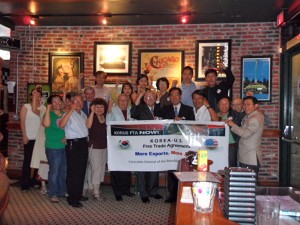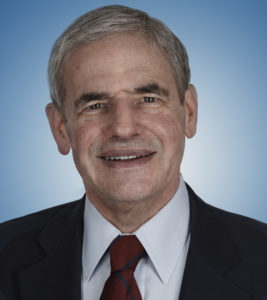I enjoyed attending a gathering in Newton, Massachusetts on July 21, sponsored by the regional Consulate General of the Republic of Korea. The consulate, based in Newton, covers five New England states: Massachusetts, New Hampshire, Rhode Island, Maine, and Vermont. The views expressed here are, of course, my own.
It was an honor to meet Consul-General Kangho Park and Consul Eun-chui Lee, and their colleagues. I also enjoyed meeting several American veterans of the Korean War, as well business people from the local Korean community.
The purpose of the event was to encourage continued support for approval of the U.S.-Korea Free Trade Agreement. The agreement was signed on June 30, 2007. Unfortunately, President Obama rejected the agreement as signed, and renegotiated terms in December 2010, making the agreement less liberalizing, as explained by Doug Bandow of the Cato Institute.
As I regularly note, including here, and as discussed in detail by Daniel J. Ikenson of Cato, the ideal trade policy for any country is unilateral removal of all trade barriers. Nonetheless, even as amended, the agreement would be an improvement over the status quo.
The consulate kindly asked me to briefly speak at the event, and I tried to reinforce the message of the Korea-U.S. Trade Partnership [now U.S. Korea Connect, as of [Nov. 3, 2015]: Trade promotes growth and job creation. Increased trade will be good for both the U.S. and Korea.
To provide support for approval of the agreement, U.S. citizens can send an online form letter [link lost as of Nov. 3, 2015] to their representatives and senators. Anyone can also Like the Korea-U.S. Partnership Facebook page.
The Three Pending Agreements, and the Trade Adjustment Assistance Program
The trade agreement with Korea is one of three agreements pending before Congress. The other two are with Colombia and Panama. Daniel Griswold of Cato has noted that experience continues to demonstrate that free trade agreements yield positive economic results:
“Judging by actual U.S. trade flows since their enactment, the 14 most recent FTAs give strong evidence that trade agreements deliver the predicted boost to trade with the partner countries. Based on this record, we can expect the pending agreements with Korea, Colombia, and Panama to promote both U.S. imports and exports for the benefit of U.S. manufacturing, agriculture, and the overall U.S. economy.”
The current obstacle to approval of all three agreements is the issue of extending Trade Adjustment Assistance (TAA). The program purportedly provides “aid to US workers who have lost their jobs as a result of foreign trade.” On its face, the program should simply be abolished, since it is just another welfare scheme.
Each of us has to adjust as the world changes every day. TAA is based on the pernicious idea that taxpayers should compensate particular people simply because of changes caused by trade. Freedom of trade is the normal, moral course, while protectionism is plunder. Absorbing the cost of welfare should not be the price of enhancing trade freedom.
Congress should approve the trade agreement with Korea, as well as the agreements with Colombia and Panama. The issue of TAA should be considered separately, but the program should be terminated.
[Updated links: Nov. 3, 2015]





